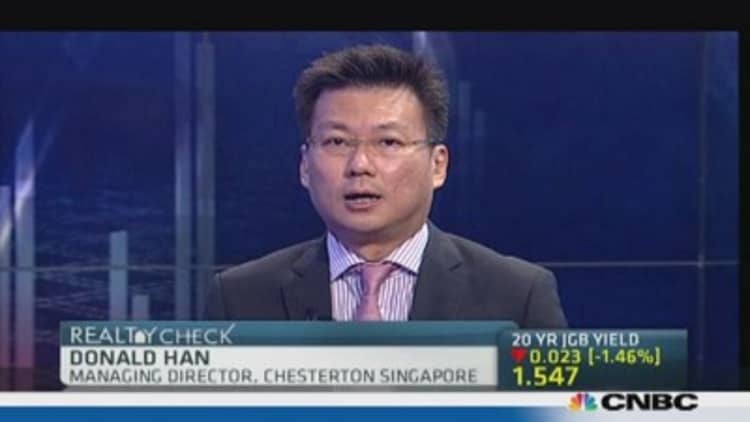Stocks trading on China's mainland exchanges are looking cheap, but as Beijing's reform agenda kicks in, they may get even cheaper.
By many measures, the mainland's markets are trading at bargain valuations. China's shares are trading at 9.3 times 12-month forward earnings, a more than 22 percent discount to the long-term average, and at 1.6 times price-to-book, a more than 26 percent discount to the long-term average, according to data from Nomura.
But investors haven't been biting. Despite a slew of reform measures now in the pipeline after the key Third Plenum, markets on the mainland have stalled, with the Shanghai Composite down around 4 percent so far this year.
(Read more: Is it time to get over your fear of U.S.-listed Chinese stocks?)
The reforms themselves, while generally viewed as positive steps, may be partly to blame.
"The Chinese leadership is prepared to allow the economy to slow down," Vasu Menon, vice president of wealth management at OCBC, told CNBC Monday.
(Read more: Place your bets: China or Japan?)
"The kind of heady growth we saw at 9-10 percent is just not sustainable. It comes at a price: Asset price inflation, property prices, income inequality. They know all that and they're trying to correct those things and the market has come to terms with it," he said.
Chinese equities valuations "do not offer screaming value," Tham Mun Hon, head of research at UOB KayHian in Hong Kong, said in a note. "They are fairly priced at current levels."
"With the move towards a new development model, the government is unlikely to actively pump-prime the economy. Against this backdrop, top-line growth for Chinese corporates has leveled out and is unlikely to see a reacceleration in the near term," Tham said.

Indeed, some analysts don't expect the reforms to have any immediate market impact.
(Read more: China's equities seen overtaking India's in 2014)
"The short-term impact of the Third Party Plenum is unlikely to be a cyclical game-changer. The implementation timeline – which runs through 2020 – extends far beyond the cyclical horizon," Ramin Toloui, Pimco's global co-head of emerging markets portfolio management, in a note. Pimco has $1.97 trillion under management.
(Read more: China-focused hedge funds buck market doldrums)
The reforms are also likely to hurt, not help some companies, especially as government measures to tighten up liquidity make it harder for smaller firms to get credit.
Pushing the economy toward a market-oriented system "means of course there will be bankruptcies. There will be problems with some of the companies," said Mark Mobius, executive chairman of Templeton Emerging Markets Group. Its parent, Franklin Templeton Investments, has over $817 billion under management.
While larger state-owned enterprises are likely to get government support, "there's a lot of private enterprise in China that has nothing to do with the state and a lot of these companies are heavily leveraged one direction or another. These are the companies that will be in trouble," Mobius told CNBC earlier this week.
(Read more: An unpolluted China?Don't hold your breath)
To be sure, analysts also see big potential stock gains further down the road.

"Because of so much negativity about China (and) very low expectations about China, the surprise to the upside could really be there," Menon noted.
Mobius also sees opportunity ahead. "The exciting thing about what's happening is you're going to see mergers (and) acquisitions; there'll be some bankruptcies and others will take market share," he said. "At the end of the day, it will be very good for investors like ourselves and the markets generally."
(Read more: Time to get picky on China stocks: HSBC)
There's another anticipated reform that has the potential to boost the mainland's markets, Mobius noted.
Currently, foreign investment into the A-share markets is strictly limited.
"More and more foreigners are going to be allowed in to the A-share market and these so called special economic zones -- starting in Shanghai but it's going to be spreading all over the coastal areas -- will include provisions for foreigners to invest in the A-share market. So that will be a push in a good direction," he said.
(Read more: China cash rates jump on liquidity worries)
Still, there is another headwind for the market. Fund managers appear to have already placed their bets into China. In December, more than 60 percent of emerging market fund managers were overweight on China's market, according to a Bank of America-Merrill Lynch survey.
It was the second-most popular emerging market bet, after Russia, the survey found.
—By CNBC.Com's Leslie Shaffer; Follow her on Twitter @LeslieShaffer1

